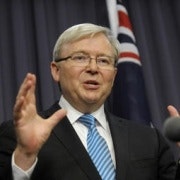Gaming Canberra's harebrained system
Time flies – especially in politics. Not many days to get the big things done.
It only seems like yesterday that we wandered to the ballot booths to elect a national government, yet here we are again gearing up for the next visit.
Tony Abbott has already jumped in and launched his "unofficial" election campaign of "real solutions for all Australians" to a hand-picked audience – televised live across the nation. He promised lower taxes and stronger borders. A booklet and an ad followed.
We know for the next eight months the airwaves, newspapers, screens and blogs will be alive with breathless, non-stop reporting on politics, polls, gaffs, tactics, twittering political idiots, trivia and more trivia.
It's already started in the tabloids and the click baiting newspaper websites.
And why not? Politics sells.
But because it's a seeming constant in our lives, it's never taken too seriously these days. It's increasingly seen as a game – high stakes, for sure, but a game nevertheless. For many, the players are second string anyway.
Which prompts a question, at least. Are our government structures right for these complex and rapidly moving times? Are we getting value for our taxes? Could the game have better rules?
It can be easily argued that Australia is vastly over-governed, with three tiers, upper houses galore and thousands of elected officials. The battles and the blame between Canberra and the states often seem just as constant and surreal as the shenanigans embedded within the workings of the farcical US Congress.
There's even been a poll – naturally – that finds the Congress less popular than cockroaches, traffic jams, root canals and off-key violinists.
Of course, in Australia the problem is not easily fixed. Politicians will never agree to meaningful reform of our structures. We will always have states, territories and local governments and the accompanying permanent flaws.
But there is an easy and simple option that will inevitably lead to better governance, longer and higher vision from the political leadership on both sides and, perhaps, to a more nuanced reporting of public policy.
And that option is for Australia's national government to have four-year terms, fixed – or even five years with a minimum of four.
Look around the globe. Look at Britain, India, China, France, Germany, the US, Brazil, Canada, Russia, Japan and the list goes on – all with a minimum of four-year or even five-year terms.
Why will this make a difference? For a start it will remove for longer the temptation by government to do the populist things within a year or so of being elected, at the expense of good nation-defining policy.
It will force federal governments to deliver at least three decent budgets – and just one 'election year' budget. Today they wet their beds generally after the first budget is done and dusted. Their eye is always on that possible poll within the next eight to ten months to take advantage of some Opposition stumble.
It will also have a welcome side effect. The weekly, fortnightly and monthly polls that embrace the political and media landscape will be mere side-shows. Four, three, two years from the election – who cares about satisfaction or net dissatisfaction or preferred prime minister or the two-party vote? What's that to do with conviction governing?
Instead, attention will turn to policy. I know it sounds far-fetched – but isn't it worth a go?
Of course, it might also strike a chord with the electorate and be pretty smart politics if Julia Gillard or Tony Abbott announced this year that – in conjunction with the federal election trip to the ballot booth – a simple and binding referendum question will also be put.
The question: The Commonwealth proposes that from the date of the following election (not the current election) the parliamentary term will be a fixed four-year term.
An option could be added arguing for a maximum of five years and a minimum of four years, with the actual election date in that last year left to the discretion of the prime minister.
Many – even dear readers of this site – will be opposed, and strongly. "These ALP governments are a farce, so why risk giving them more time to stuff up and add to our spiralling debt” will be an easy refrain.
However, in a democracy it would be an interesting exercise at least. Ask all Australians what they think. If they prefer the current short terms and all that which comes with it, then so be it.
But with current and growing public cynicism that surrounds the workings of our political establishment, such a proposal may strike a rich vein of support.
And for the leader who proposes it first and argues it wholeheartedly and openly, it may even turn out to be good short-term politics.
Alister Drysdale is a Business Spectator commentator and a former senior advisor to Malcolm Fraser and Jeff Kennett.
















